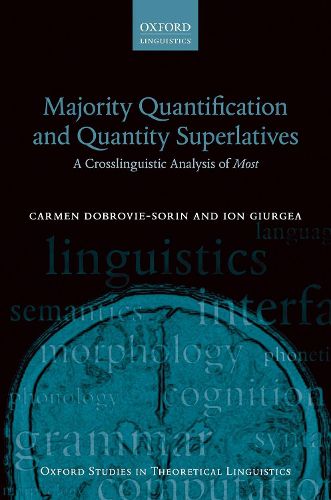Majority Quantification and Quantity Superlatives: A Crosslinguistic Analysis of Most
Carmen Dobrovie-Sorin (Emeritus CNRS Researcher, Emeritus CNRS Researcher, Laboratoire de linguistique formelle, Universite de Paris),Ion Giurgea (Senior Researcher, Senior Researcher, 'Iorgu Iordan - Al. Rosetti' Institute of Linguistics, Bucharest)

Majority Quantification and Quantity Superlatives: A Crosslinguistic Analysis of Most
Carmen Dobrovie-Sorin (Emeritus CNRS Researcher, Emeritus CNRS Researcher, Laboratoire de linguistique formelle, Universite de Paris),Ion Giurgea (Senior Researcher, Senior Researcher, 'Iorgu Iordan - Al. Rosetti' Institute of Linguistics, Bucharest)
This book investigates the syntax and semantics of proportional most and other majority quantifiers across languages. Carmen Dobrovie-Sorin and Ion Giurgea draw on data from around 40 languages to demonstrate the existence of two distinct semantic types of most: a distributive type, which compares cardinalities of sets of atoms, and a cumulative type, which involves measuring plural and mass entities with respect to a whole. On the syntactic side, the most significant difference is between partitive and non-partitive configurations: certain majority quantifiers are specific to partitive constructions, while others are also allowed in non-partitives. The volume also explores complex expressions of the type the largest part and nominal quantifiers of the type the majority. The authors argue in favour of a quantificational analysis of most, in contrast to many recent studies, but adopt a bipartition-cum-superlative analysis for the largest part. The volume is a large-scale crosslinguistic investigation, offering typological insights as well as case studies from a range of languages, including German, Romanian, Hungarian, Hindi, and Syrian Arabic. The findings have implications for the study of number marking, partitivity, kind reference, (in)definiteness marking, and other crucial issues in linguistic theory.
This item is not currently in-stock. It can be ordered online and is expected to ship in approx 2 weeks
Our stock data is updated periodically, and availability may change throughout the day for in-demand items. Please call the relevant shop for the most current stock information. Prices are subject to change without notice.
Sign in or become a Readings Member to add this title to a wishlist.


